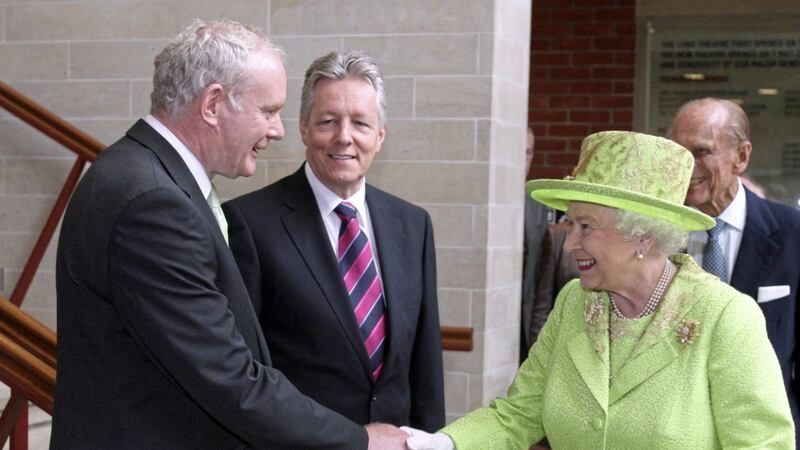There’s too much play-acting at peace-making. Reconciliation needs our urgent, relentless attention. It’s a lifetime journey – not an election cycle.
Society properly focuses on big ticket news items like Brexit and borders. Similar attention is needed to building relationships of respect and rights. And not through the rhetorical colonisation of words or ideas.
Engagements between the Irish presidency and Queen Elizabeth, including those involving Martin McGuinness, helped stabilise Ireland-UK relations during the past decade. While politics was driven into cyclical (so-called) ‘crisis’, patient diplomacy kept with the long game.
Between 2011 and 2014, the president’s secretary general Adrian O’Neill was a crucial figure. Mr O’Neill became Ireland’s ambassador to the UK in 2017. When he speaks, it’s worth listening.
Ambassador O’Neill recently remarked that Ireland-UK relations are in a “challenging phase”. He cautioned everyone to “be vigilant” for the peace process and Good Friday Agreement.
“The long-term job of reconciliation, which is going to take many more years, must be sustained,” he said. “We must stay the course and protect all (the agreement’s) principles – not partial interpretations, but all.”
We regularly hear – from all sides - that the 1998 Good Friday Agreement matters in ‘all its parts’: each element is interdependent and interlocking. This imposes responsibilities. The agreement’s complexity demands the courage of its collective implementation. No agency or actor is exempt.
Yet instead of healing our past, we have harnessed it as an ongoing battleground. Perhaps that partly stems from the words and agendas that shape our debate.
Some will talk about truth. But what about honesty? Some will talk about remembrance. But what about memory? What about a million different recollections of the very same experience – without any side defending their ‘Holy Grail’?
Truth recovery is a particular concept. But these are also two distinct objectives – ‘truth’ and ‘recovery’. Both create demands upon others. By contrast, honesty and memory are imperfect gifts we choose to give. Surely a good starting point for reflection - and reconciliation?
Some controversy arose over next week’s church service in Armagh and the non-attendance of President Higgins. In real terms, this was a bump in the road: a lack of nuance in organisation, not a lack of goodwill from any side.
The bigger challenge is to reconstruct diplomatic channels that calmly avoid such situations from constantly becoming the new hill on which virtual battles are fought.
Reconciliation won’t happen at one prayer service. But nor will it be won through press statements. Reducing everything to a test of nationalistic loyalty is gravely counter-productive. Look at Brexit.
As with diplomacy, reconciliation needs more than just formulae of words. It pleads for spirit alongside substance: courageous actions that evidence our willingness to walk in worldviews which challenge our own particular experiences and perspectives. It’s seen in quiet relationships emerging gently from mutual commitments for common good. It’s the leadership of giving, without any guarantee of reciprocation. The act becomes the outcome. (Look at Tutu and Mandela’s approach. And even then, deep societal wounds still persist.)
Reconciliation starts with the journey of fundamental personal change inside each of us – not others. No dictionary of words can surpass the wisdom gained by humbly engaging those who may still harbour unhealed hurts. Our politics has largely mislaid this essential ingredient that ended conflict and restored power-sharing in 2007.
Reconciliation isn’t just a ‘policy’. It’s an essential personal philosophy for recovering communal human dignity that we, as a society, collectively devastated – through our actions or inactions – during two generations of appalling conflict.
That’s why reconciliation and relationships, rights and respect, became visions at the agreement’s core. So too did the democratic institutions across these islands – including our local assembly and executive. The visions cannot be delivered without the institutions.
Our island has been transformed since 1998, but there is much unfinished business. Many people honourably yearn to sow the seeds of border referendum(s), but do so without ploughing the stony fields of reconciliation. The conundrum is that crops usually fail in hard ground. We owe the agreement a duty of care – ‘in all its parts’.








